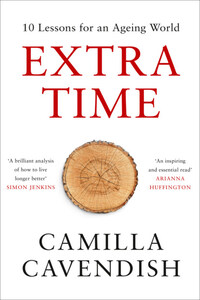HarperCollinsPublishers
1 London Bridge Street
London SE1 9GF
www.harpercollins.co.uk
First published by HarperCollinsPublishers 2019
FIRST EDITION
Text © Camilla Cavendish 2019
Illustrations © HarperCollinsPublishers 2019
Cover design by Steve Leard © HarperCollinsPublishers 2019
Cover photograph © Shutterstock.com
A catalogue record of this book is available from the British Library
Camilla Cavendish asserts the moral right to be identified as the author of this work
All rights reserved under International and Pan-American Copyright Conventions. By payment of the required fees, you have been granted the nonexclusive, non-transferable right to access and read the text of this e-book on screen. No part of this text may be reproduced, transmitted, downloaded, decompiled, reverse engineered, or stored in or introduced into any information storage retrieval system, in any form or by any means, whether electronic or mechanical, now known or hereinafter invented, without the express written permission of HarperCollins e-books.
Find out about HarperCollins and the environment at www.harpercollins.co.uk/green
Source ISBN: 9780008295158
Ebook Edition © May 2019 ISBN: 9780008295189
Version 2019-04-25
IN 2018, A DUTCHMAN began a court battle to make himself legally 20 years younger. Emile Ratelband, 69, told a court in Arnhem in the Netherlands that he did not feel ‘comfortable’ with his official chronological age, which did not reflect his emotional state – and was preventing him from finding work, or love online. He wanted to change his date of birth from 11 March 1949 to 11 March 1969.
Doctors had told him that his body was that of a 45-year-old, Ratelband argued. ‘When I’m 69,’ he said, ‘I am limited. If I’m 49, I can take up more work. When I’m on Tinder and it says I’m 69, I’m outdated.’ His friends had urged him to lie, he claimed, but ‘if you lie, you have to remember everything you say’.
Ratelband compared his quest to be identified as younger with that of people who wish to be identified as transgender – implying that age should be fluid. He said his parents were dead, so could not be upset by his desire to turn back the clock. He even offered to waive his right to a pension.
Ratelband, a ‘positivity coach’, is a provocateur who enjoys attention. The court turned him down, ruling that an age change would have ‘undesirable implications’ for legal rights, such as the right to vote. But this seemingly frivolous case actually illustrates something profound: we are on the cusp of an entirely new period in our history, which is coming at us fast.
This is the advent of Extra Time.
If you are in your fifties or sixties today, you have a very good chance of living into your nineties. If you play your cards right and have luck on your side, many of those years could be healthy and productive. Our chronological age is becoming decoupled from our biological capabilities.
In football, ‘extra time’ is the period when there’s everything still to play for. That will be true for many of us. Droves of people are ‘unretiring’ and going back to work. Advances in biology and neuroscience will help us stay younger longer. But our institutions, and our societies, have not caught up. Ratelband’s looks, his physical strength, his ambitions are out of kilter with what we traditionally associate with being 69. He feels compelled to go to the extreme lengths of changing his birth date. Why can’t we, instead, just change our view of what it means to be 69?
The Fierce Urgency of 100
In 1917, King George V of England sent the first ever telegram to a centenarian. It was handwritten, and delivered by bicycle. In 2017, Queen Elizabeth II sent out thousands of 100th birthday cards, with a team of seven employed to administer them all.>1
The era of Extra Time will see a growing number of centenarians. The Office for National Statistics estimates that one in three babies born in Britain today will live to 100. Some scientists even think we could live to 150 (as we will see in Chapter 6).
This should be a fairy tale. Instead, there are widespread fears that we are sitting on a ‘demographic time bomb’, with droves of elderly people about to bankrupt governments and hurt GDP. If people get less creative as they age, and stop work around 60, economies could slump and younger generations could face crippling taxes.








